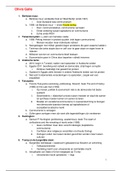Summary
Samenvatting Woordjeslijst geschiedenis (ingekort door corona)
- Course
- Institution
Beschrijving van alle woordjes uit studiegids geschiedenis (corona-editie), beschrijvingen gehaald uit eigen notities van de les, powerpoints en cursus. 12/20 in eerste zit
[Show more]



